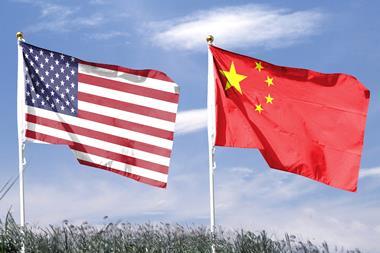More than a year after the US Department of Justice ended its controversial China Initiative, amid growing criticism that it was tantamount to racially profiling researchers and detrimental to the nation’s scientific enterprise, cases of inappropriate links between academics in the country and the Chinese government are still coming to light.
Established by the Trump administration to quash Chinese state-backed efforts to steal US intellectual property (IP) or trade secrets from universities and industry, the China Initiative was cancelled in February 2022 after many criminal cases that the justice department brought against researchers were dismissed. Harvard’s former chemistry department chair Charles Lieber – who was convicted more than a year ago of receiving millions of dollars in research funding from China – still awaits sentencing later this month, however.
During a 3 March media briefing on competition and research security at the American Association for the Advancement of Science’s (AAAS) annual meeting in Washington DC, the head of research security at the US National Science Foundation (NSF) revealed a concerning case that had just come across her desk that morning. The questionable contract was signed between an NSF-funded researcher in the US and an entity associated with the Chinese government, but neither the NSF nor his home institution in the US were aware of it, according to Rebecca Keiser, the NSF’s chief of research security strategy and policy.
Under the arrangement, the Chinese entity agreed to pay the researcher $1 million (£831,000) to establish a lab at a Chinese institution, on top of a monthly salary, plus additional funding for equipment to launch the facility and conduct research there, said Keiser, who is the first to hold her position after the NSF established it about three years ago.
The intent of the contract, which contained no termination clause, is to promote the Chinese government’s national defence and economy, Keiser noted. Furthermore, she said the research proposal that the scientist in question had submitted to the Chinese funder was identical to the one that he has used to apply for and receive funding from the NSF.
‘One can argue that if this contract had been disclosed, perhaps we could have addressed the issues in it and resolved the conflicts that were inherent there, but the contract wasn’t disclosed,’ Keiser told the AAAS audience. ‘You can see how there was international involvement in this case, but in no way could you call this an international collaboration.’
New law forces change
President Biden signed a law in August that prohibits researchers working on federal agency-funded programmes from participating in ‘malign foreign talent recruitment’ programmes. Scientists will have to disclose their participation in such programmes in their research award proposals.
The new law designed to bolster US competitiveness is dubbed the Chips and Science Act and explicitly lists characteristics of such ‘malign’ foreign programmes. These include the unauthorised transfer of IP, the establishment of a lab or appointment in a foreign country that violates the terms of an ongoing federal research award, the inability to terminate a contract and failure to acknowledge one’s home institution or funding agency in the US.
Starting next summer, federal grantees will be required to certify in their research grant proposals that neither they nor any of their researchers or students are participating in such a foreign talent recruitment scheme. They will also have to make the same declaration annually for the duration of their research award. The Chips act specifically lists China, Russia, North Korea and Iran as countries of concern.
Keiser said the NSF plans to implement the new law by adding a certification to the grant application process that will likely be part of 2024 awards. ‘We are going to need to provide more guidance to our research community on what such a “malign” programme is,’ she added.
The new law also requires the NSF to establish an organisation that Keiser referred to as ‘a risk assessment centre’ to provide information to the research community about the new security provisions, as well as tools for scientists and their institutions, to assess what collaborative activities are prohibited.
How universities will implement the new legal requirements will depend in part on the guidance that comes from agencies and the White House about what constitutes prohibited foreign recruitment initiatives. ‘In the legislative language, we worked with Congress to get this as specific as possible, because if it is not understood by researchers what these programmes are then we will have a big challenge in actually implementing it,’ said Toby Smith, the Association of American Universities’ vice president for policy.
Vetting all outside funding properly
‘What was really critical is that important international collaborations are not captured as a part of that legislative language, and that it still be made clear to researchers that they should be engaged internationally,’ he added.
These concerning foreign programmes that recruit scientists in the US generally work by giving ‘gifts’ directly to faculty, according to Smith noted. In contrast, he said, legitimate research grants and contracts go through the university.
Therefore, from a university compliance standpoint, he suggested that universities can help protect their faculty and IP if they require that any offer for funding from an external source – particularly a foreign government – be vetted before an agreement is signed. It has been estimated that theft of IP and trade secrets by China resulted in the US losing about $300 billion to $600 billion in 2020 alone.
Beyond the US, the G7 countries have a group focused on security and integrity in the global research ecosystem, which has already developed principles in this area. ‘The next step is now to look at practices – how do we share information such as on risks and what we are doing about it,’ Keiser said. The Japanese government – which will host the G7 summit in May – has indicated that this is one of the priority areas to be addressed at that event.
Separately, Keiser notes that the US is coordinating very closely on these issues with the UK, Canada and Australia. ‘We are seeing unfortunate malign government foreign interference across the globe, and this is something that we need to make sure that we address,’ she told the AAAS audience.
Beyond the US, the UK government announced almost two years ago the creation of a new unit to advise the country’s researchers on security-related topics, including IP protection. To harden its defence against the threat from China, the UK reformed its scheme for certifying foreign students from outside the EU to study or conduct research in certain sensitive technology-related fields in October 2020.
More recently, the Canadian government made the decision to no longer fund grant applications for studies in a sensitive research area if any of the participating researchers are affiliated with a university, research institute or lab connected to the military, national defence or state security of a foreign country deemed to pose a national security risk.
These developments are against the backdrop of a new report from the Australian Strategic Policy Institute warning that China has a ‘stunning lead’ over the US and other nations in high-impact research across most critical and emerging technologies.
The report found that all the world’s top 10 leading research institutions are based in China for some technologies and are collectively generating nine times more high-impact research papers than the second-ranked country, which is most often the US.

















No comments yet